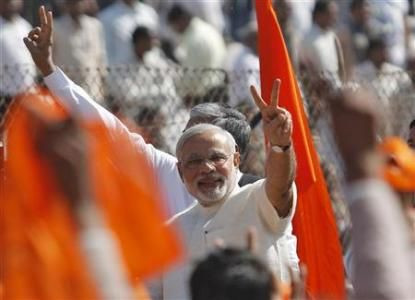India’s Controversial Minister Narendra Modi Is One Step Closer To Becoming Prime Ministerial Candidate For 2014 Elections, Except That His Party BJP Can't Decide

Narendra Modi, the chief minister of India’s Gujarat state, was inducted into the topmost decision-making body of India’s right-wing Bharatiya Janata Party (BJP) Sunday, a “promotion” hailed as his “formal arrival on the national stage,” despite the fact that he had earlier served on the panel, but had been dropped under pressure from the Hindu nationalist Rashtriya Swayamsevak Sangh (RSS), the ideological fountainhead of various Hindu groups including the BJP.
His return after six years to the BJP parliamentary board as well as to the party’s main election committee, however, marks the inexorable march of a state politician with a tainted human rights record, to become BJP’s trump card in the 2014 parliamentary elections, much to the chagrin of a section within the party.
The poster-child of India's right-wing party has managed to rise above the odds, as the communal riots of 2002 — in which more than 1,000 people were killed in Gujarat, most of them Muslims, during Modi's first term as chief minister — seem to have taken a backseat in the Indian public’s memory, despite the fact that the riots are brought up at the drop of a hat.
The irony of slamming Modi as a Hindu zealot lies in the fact that he had the “misfortune” of falling out of favor with RSS, an organization that has an avowed objective to turn India into a Hindu nation.
The Vishwa Hindu Parishad (VHP) President Pravin Togadia, at the Hindu Sangam organized Sunday in Ahmedabad, took indirect digs at Modi for his recent attempts to build bridges with minority communities in Gujarat, the Times of India reported.
The hard-line VHP was founded in 1964 by a group of senior leaders from RSS to give Hindus what they claim to be a definite sense of religious and political identity.
"Anyone who embraces minority communities for vote bank politics do not deserve to form a government or represent the public,” Togadia said Sunday without naming Modi.
VHP's Gujarat chief Dilip Trivedi added: "There are some leaders who grabbed power using the name and cause of Ram temple but are now busy propagating their own image and dreaming big for themselves."
Nevertheless, RSS chief Mohan Bhagwat found the day of Modi’s induction to the BJP’s apex body the right moment to set the Hindutva tone.
“Stage has been set for Hindus to take the intellectual leadership of the world...Whole world has no other option but to follow Hindus,” Bhagwat said, the Press Trust of India (PTI) reported.
Sunday’s event was reportedly the first time that Bhagwat has attended a public function organized by the VHP in Gujarat, signaling a streamlined working agenda in the run up to the parliamentary elections.
Another Hindu nationalist party exhibiting chameleon-like quality with regard to Modi is the Shiva Sena, which, after declaring in December that it has “no problem if Modi is declared as the NDA’s (BJP-led National Democratic Alliance) PM candidate,” voiced its support in January for Sushma Swaraj, leader of the opposition in the Lok Sabha, as NDA’s prime-ministerial candidate.
Aside from the wavering support for Modi from party power bases, BJP sings “How do you solve a problem like Modi?” mostly due to his incompatibility with key NDA-ally JD(U) (Janata Dal (United)) and its formidable leader and Bihar Chief Minister Nitish Kumar.
Asked whether Modi's promotion was an indicator of his projection as PM candidate, JD(U) Bihar unit spokesman Niraj Kumar said, “JD(U) leadership's stand in this regard has been known to one and all. We believe that a prime ministerial candidate should have secular credentials to take along diverse group of people of the country,” the Press Trust of India reported.
Kumar, however, added that Modi's induction is an “internal matter” of the BJP.
India’s party politics aside, Modi’s image in the West, which continues to associate him with the 2002 riots, appears to have improved, with the U.K. and the EU recently ending its decade-long boycott of the Gujarat chief minister, although the U.S. continues to deny visa to Modi.
As Gujarat’s chief minister, Modi has earned a reputation as an economic reformer, who has encouraged investment, helped bring reliable electricity, law and order and double-digit growth. Despite the criticism that Modi’s economic model does not share the profits broadly enough, with some states including southern states of Tamil Nadu and Karnataka, faring better at bringing down poverty levels, his appeal to Gujarat’s and the rest of India’s middle classes is irrefutable.
© Copyright IBTimes 2025. All rights reserved.






















